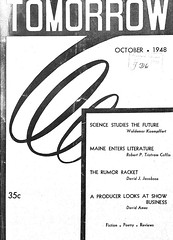Yet another review of the American edition of Reed's A Map of Verona and Other Poems turned up in Google Book Search recently, this one by the poet, editor, and translator Babette Deutsch.
It appears in the Books section of the October, 1948 issue of Tomorrow. Tomorrow was a literary magazine published by the Creative Age Press in New York from 1941 to 1951, devoted to 'creative living' and to printing 'the real experiences of those who have adjusted themselves to new countries and new processes of living.' It was founded and edited by the Irish medium Eileen J. Garrett (1893-1970), who was once 'probably the best-known and most reliable psychic in the world,' according to Life magazine. She had run a labor hostel in London for wounded soldiers after World War I, and in her memoir Adventures in the Supernormal (1949), she claims 'after the first World War, I was among those who helped gather together the posthumous writings of the young poets.'
In addition to Tomorrow, Mrs. Garrett also established the Parapsychology Foundation of New York in 1951, publishing the International Journal of Parapsychology. This issue of Tomorrow sports critiques of Graham Greene and Aldous Huxley, but also includes a review of Dr. Jan Ehrenwald's Telepathy and Medical Psychology (New York, 1948). As woo-woo as this all sounds, the contributors and writing seem top-notch.
Babette Deutsch was born in New York City in 1895, and was the author of ten books of poems, four novels, and several books of criticism, as well as a respected translation of Eugene Onegin. She lectured at the New School for Social Research and Columbia University, which awarded her an honorary doctorate in 1946. She was married to the translator Avrahm Yarmolinsky, who was the head of the Slavonic Division of the New York Public Library.
Deutsch reviews Richard Wilbur's The Beautiful Changes and Reed's A Map of Verona, both published a year earlier, in 1947. Wilbur's gift, she feels, is 'to change what his poetry touches back to wonder'; whereas Reed is more 'an unwilling pupil [of Eliot] rebelling against his master,' who 'has not learned his lesson well.'
The Lessons of the War she describes as 'arresting,' and possessing a 'restrained power'; some of his other pieces exhibit a 'melancholy loveliness.' But on the whole, she finds Reed's volume lacking. His verse is 'cloying' in its melodiousness; 'curiously middle-aged' and Georgian; 'soporific' and colorless. Deutsch compares him unfavorably with Aiken, Ransom, and finally Wilbur. All this in one paragraph of 220 words.
To give credit where credit is due: I never would have found Deutsch's review if two-thirds of it weren't devoted to singing the praises of Richard Wilbur. It had been dutifully and lovingly cataloged by Wilbur's biographers and bibliographers.








